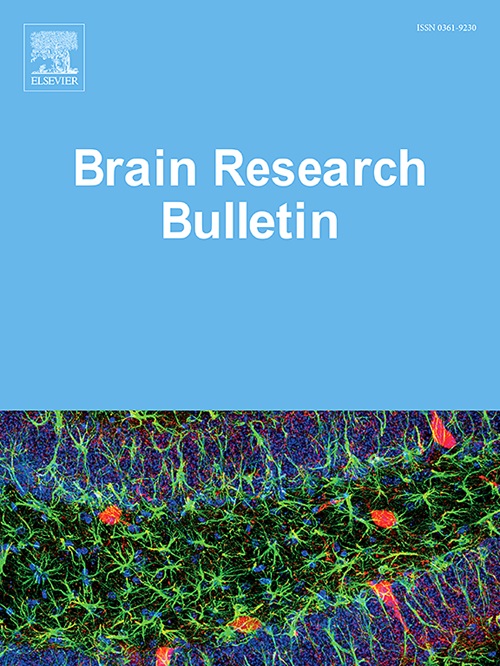Increased DNA methylation of Igf2 in the male hippocampus regulates age-related deficits in synaptic plasticity and memory
IF 3.7
3区 医学
Q2 NEUROSCIENCES
引用次数: 0
Abstract
The aging process is characterized by a general decline in cognitive abilities, which affects nearly 33 % of U.S. adults over the age of 70 and is a risk factor for the development of dementia and Alzheimer’s disease. Numerous studies have reported increased neuroinflammation and impaired synaptic plasticity and memory with age in the hippocampus, a major brain region involved in the formation and storage of most memories. However, much remains unknown about the mechanisms that contribute to age-related deficits in synaptic plasticity and memory. The Insulin-like growth factor 2 (Igf2) is a genomic imprinted gene that is expressed from a single allele in all species. Though IGF2 has been shown to be important in development, synaptic plasticity, and memory formation in the hippocampus and administration of IGF2 can improve memory late in life, whether changes in regulation of this gene contribute to age-related memory decline have yet to be explored. Here, we show that aged (24 months) male rats have increased CpG-site specific promoter methylation and reduced expression of Igf2 in the hippocampus relative to young adult (3 months) and middle-aged (12 months) rats. Importantly, CRISPR-dCas9 mediated increase of DNA 5-hydroxymethylation, an active transcriptional mark, of the Igf2 promoter in the hippocampus improved memory and long-term potentiation in aged, but not middle-aged, rats. These data indicate that increased DNA methylation of Igf2 in the hippocampus contributes to age-related deficits in synaptic plasticity and memory.
男性海马体中Igf2 DNA甲基化增加调节突触可塑性和记忆的年龄相关缺陷
衰老过程的特点是认知能力普遍下降,70岁以上的美国成年人中有近33% 受到影响,这是痴呆症和阿尔茨海默病发展的一个危险因素。大量研究表明,随着年龄的增长,海马体中的神经炎症增加,突触可塑性和记忆受损,海马体是大脑中参与大多数记忆形成和储存的主要区域。然而,关于突触可塑性和记忆中与年龄相关的缺陷的机制仍然未知。胰岛素样生长因子2 (Igf2)是一种基因组印迹基因,在所有物种中均由单个等位基因表达。虽然IGF2已被证明在发育、突触可塑性和海马体的记忆形成中起重要作用,并且IGF2的管理可以改善晚年的记忆,但该基因的调节变化是否会导致与年龄相关的记忆衰退还有待探索。在这里,我们发现,与年轻成年(3个月)和中年(12个月)大鼠相比,老年(24个月)雄性大鼠海马中cpg位点特异性启动子甲基化增加,Igf2表达减少。重要的是,CRISPR-dCas9介导的海马Igf2启动子的DNA 5-羟甲基化(一种活跃的转录标记)的增加改善了老年大鼠的记忆和长期增强,而不是中年大鼠。这些数据表明,海马中Igf2 DNA甲基化的增加有助于突触可塑性和记忆的年龄相关缺陷。
本文章由计算机程序翻译,如有差异,请以英文原文为准。
求助全文
约1分钟内获得全文
求助全文
来源期刊

Brain Research Bulletin
医学-神经科学
CiteScore
6.90
自引率
2.60%
发文量
253
审稿时长
67 days
期刊介绍:
The Brain Research Bulletin (BRB) aims to publish novel work that advances our knowledge of molecular and cellular mechanisms that underlie neural network properties associated with behavior, cognition and other brain functions during neurodevelopment and in the adult. Although clinical research is out of the Journal''s scope, the BRB also aims to publish translation research that provides insight into biological mechanisms and processes associated with neurodegeneration mechanisms, neurological diseases and neuropsychiatric disorders. The Journal is especially interested in research using novel methodologies, such as optogenetics, multielectrode array recordings and life imaging in wild-type and genetically-modified animal models, with the goal to advance our understanding of how neurons, glia and networks function in vivo.
 求助内容:
求助内容: 应助结果提醒方式:
应助结果提醒方式:


